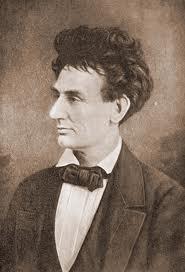
Everyone is talking about Lincoln, the movie, including one Edmund N Santurri, "a professor of religion and philosophy and director of the Ethical Issues and Normative Perspectives Program at St Olaf College in Northfield, Minn." It takes balls of brass to disagree with him, because "[h]e has taught a seminar on 'The Religious Sensibility of Abraham Lincoln,'" but here goes.
Dr Santurri's point is that the movie gives short shrift to Lincoln's religion. It's possible, however, that he overstates the case. I think at the very least he gives short shrift to Lincoln's skepticism, which, in his telling, is essentially the pose of a callow youth who in his mature greatness acquired a religious soul. That doesn't really stand up, however. When Lincoln, age 37, ran for Congress in 1846, his opponent, a Methodist minister, accused him of "infidelity." Presumably, the charge was something more than a pure fabrication, and Lincoln felt compelled to respond--in the form of a campaign handbill. Here it is--quite an interesting document, I think. Lincoln gives no explanation for not being a church member, a current fact. He has never denied the truth of Scripture but does not now affirm it. He says that he has never spoken with intentional disrespect of religion but does not say that he believes in it now. He does not now disavow the skeptical views to which he admits being attracted as a younger man. Now, Lincoln was an ambitious man, and being connected in any way with enmity toward religion wasn't going to aid his prospects for advancement. The handbill therefore is interesting mainly for what it does not say. Lincoln does not say that he is a believer.
The Lincoln who was seeking a seat in the House of Representatives in 1846 was not a posturing college student in the thrall of whatever philosopher he had last read. People do not often change their views on these questions after age 35, although I admit that presiding over the Civil War is the kind of thing that might cause one to rearrange some furniture. Santurri's account of Lincoln's spiritual development, however, has the effect of reducing Lincoln. Yes, two sons died, but who really thinks Lincoln was the kind of man whose view of things would be overturned by death under his roof? It's indisputable that he used religious language in his presidential oratory--most memorably, in his Second Inaugural address. It's possible, I think, that Lincoln knew his audience at least as well as Dr Santurri knows Lincoln's mind.
